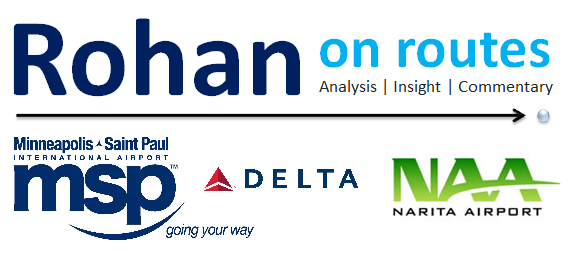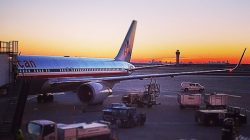
Delta Air Lines has allegedly threatened to axe its nonstop flight from Minneapolis/St. Paul to Tokyo Narita if Tokyo Haneda airport will be opened to more carriers. The U.S. and Japanese governments are currently discussing a proposal to increase Haneda airport’s accessibility, which would in turn potentially drive traffic away from Narita airport. according to an article in the Minneapolis/St. Paul Business journal.
According to the Journal, Delta Special Council Ben Hirst remarked that if Narita airport lost connecting flights to other destinations, Delta would, “end its Minnesota flights to Japan altogether.” Delta’s daily flight to Tokyo Narita airport is the sole nonstop service to Asia from MSP airport, although this is a historical route that was inherited from Delta’s merger with Northwest Airlines. MSP airport, formerly a Northwest hub, has operated nonstop services to Tokyo for decades.
The article unfortunately conjures a sensationalist tone as a direct consequence of Delta’s aggressive – and increasingly controversial – uses of force to throw its weight around making demands in global aviation spheres. It only takes a little bit of extra scanning to read between the lines and uncover what the real story is in this posturing maneuver, which is buried right in the middle of the text:
Delta wants Japan to either keep its two airports operating at status quo or completely open up Tokyo International Airport in Haneda to everyone. Hirst said Haneda could accommodate Delta as a hub.
The bold underlinings say everything: the issue has nothing to do with MSP airport as a viable gateway hub to Tokyo, but instead has everything to do with how badly Delta covets increased access to Tokyo Haneda airport.
Delta’s desire to enlarge its footpoint at Tokyo Haneda is not new, and aligns more broadly with its quest to bed down its Asia Pacific long-term strategy. Its demands in Tokyo even pre-date its Northwest merger, as NWA (then Northwest Orient) once operated a hub at Haneda airport. The carrier was ousted to Narita airport in the 1970’s after the Japanese government mandated that foreign carriers move to the privately-owned Narita due to space constraints at Haneda.
In 2010, the landscape changed when a fourth runway was constructed at Haneda airport that permitted increased foreign carrier presence at Haneda. The airport, located closert to downtown Tokyo, is preferred by originating and terminating passengers to the Tokyo metro area due to its proximity to the central business district. Unfortunately, few U.S. carriers have achieved success operating into Haneda airport due to inconvenient take-off and landing slot times allocated to them by the Japanese government.
Richard Anderson, CEO of Delta, ruffled feathers back in 2013 by demanding that Delta receive special privileges in the Haneda slot allocations as a conciliation for the eviction from Haneda back in the 1970’s. In a nation where, “go-global, act local” is everything, such requests were not honored. Hardball-style of negotiation never sits favorably among Asian cultures, especially from the West.
Further, for Delta to insinuate that a spool-up of Haneda’s accessibility to foreign carirers would invertly spool-down the operations at Narita is counter-intuitive. Delta does not have a Japanese partner in Tokyo, and relies entirely on its own operations for sending flow traffic over Tokyo to points within Asia. Delta has been the perpetrator of its own actions as it has spooled-down its Narita hub in recent years by canning service to several intra-Asian markets and decreasing seat capacity on a few of its US long-haul flights.
This, of course, does not bode well with the Japanese government for ulterior reasons as well, given that Narita is a privately-owned airport and Haneda is publicly-owned. Narita has far more to lose in these scenarios. The irony, moreover, is that Delta is vindicating the Japanese government for causing foreign carriers to pull services from Narita airport when, in actuality, these are decisions that Delta is making entirely on its own. The carrier has dropped service from Narita to San Francisco, Seoul and Beijing in recent years. Its service from Narita to Hong Kong was recently dropped in 2014, but re-instated during Winter 2015-2016 while its Seattle – Hong Kong flight was spooled down. Delta has not been impacted, directly nor indirectly, by the migration of foreign carriers from Narita airport to Haneda.
These decisions more broadly reflect Delta’s frustration for lacking a local Japanese partner in Tokyo and holding onto the notion that the only way in which it can compete more effectively against United (who operates a JV with ANA) and American (who operates a JV with JAL) in Japan is to have access to Haneda. It also underscores the fact that Delta’s transpacific gateway hub at Seattle is highly overshadowed by United at San Francisco and American’s growing base at Los Angeles. This – combined with the lack of a local partner – puts Delta in a position where it has the most to lose.
Therefore, it is conceivable that Delta will want to make empty threats in a hub market where it operates a monopoly – like MSP airport – and where there is a sole route to Asia that it can threaten to unplug if its demands are not met. Delta will likely never take this step, but it does know that MSP can be used to prove a point. It has used MSP airport as a scapegoat in the past when it took its anti-Gulf Coast carrier stance, alleging that further growth of the Middle East carriers, if allowed by the US government, would “cost thousands of jobs” in the state of Minnesota. Again, the empty-threat component here is blatant, as well as two-fold: none of the major Gulf carriers operate into MSP airport, and, as is, Delta already shifted thousands of jobs from MSP to Atlanta and other stations after it merged with Northwest.
The same kind of political force doesn’t have as much pull in Delta’s other hubs: making threats to pull international service in Atlanta and New York sound too ludicrous for the public to believe, Seattle and Detroit have multiple flights to Asia (and again this would sound too inconceivable for the public to believe) while LAX is fragmented among competitors and Salt Lake City does not have a nonstop flight to Asia. Its only remaining flights to Tokyo hail from Portland, Guam and Honolulu, which are spoke markets that too minor/insignificant to drum-up the same level of attention as Minneapolis.
Further, Delta knows that it can ride off of some of the lingering resentment in the Twin Cities after it acquired Northwest, still digesting the, “loss of a hometown carrier” syndrome that inevitably occurs when mergers move headquarter locations to other regions of the country. The feelings are not as acrimonious as they once were, but it doesn’t take two tries to kick over an ant hill. This is despite the fact that Delta’s MSP hub is as robust, if not more, than it was during the NWA days, and sustains a voluminous O&D market to multiple points throughout Delta’s domestic system and a few salient international points (Tokyo, London, Paris, Amsterdam and Rome). It is, after all, the second largest hub in Delta’s system. For the carrier to threaten that it would unplug is sole flight to Asia would be a severe miscalculation.
Put objectively, Delta is not going to pull its MSP flight. Will it continue to use MSP as an object? Yes. Will it rally Minnesotans to stand behind its cause? Probably. Are such allegations baseless and used to billow smoke without fire? Definitely.


